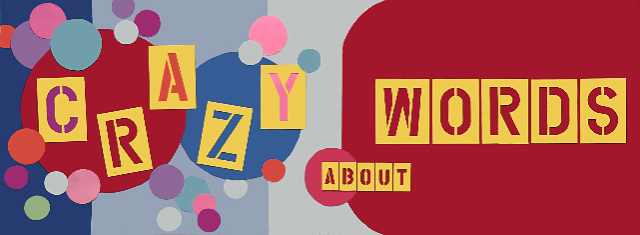Some ado about prepositions
Joe Mc Kay’s
“Crazy About Words”
…toasting our language since 2003!
If you’re like me, this is the first, or at most the second time you’ve thought about prepositions since somewhere around sixth grade. And learning about them even then was a non-event, akin maybe to studying the teeth’s role in chattering … they happen automatically… what’s to learn? Plenty, I’ve discovered, researching this column, if you really want to get into the subject.
But today I’ll simply raise your consciousness enough so that when your Valentine coos, “Little things mean a lot, sweetheart,” you think prepositions. And you reply, “Yes, honey, of, to and in are among the ten most frequently used words in the English language.”
You hear back, “What are you talking about?”
You can’t resist, “Honey, you are stranding a preposition. For sure you’ve been taught never to use one at the end of a sentence.”
Although your honey has a this-is-the-Valentine-from-hell look in her eye, she blinks and rises to the occasion, “But remember even Winston Churchill made fun of that rule. ‘This is the sort of English up with which I will not put,’ he said, to illustrate its awkwardness.”
You’re stunned by her knowledge and playfulness. And apropos of your loving concession, you share a bon mot Somerset Maugham once delivered, “Usage is the only test. I prefer a phrase that is easy and unaffected to one that is grammatical.”
You both swoon. You feel you’re on the verge of ‘living happily ever after,’ and you say so, aware as you do that something is not exactly right in your grammatical thinking. “Let’s go to ‘Crazy About Words’ and learn a little more,” you suggest.
After, while most frequently used as a preposition, is, in this case, an adverb. It modifies the verb ‘living’ in the phrase ‘living happily ever after.’
A preposition is a word that links a noun or pronoun to other words in a sentence, in terms of time (the calm after the storm), space (the dog chased after the cat), or logic (she is named after her mother). Together, the preposition and its complementary noun or pronoun are called a prepositional phrase; the full phrase is most commonly used as a noun, adjective, or adverb.
Prepositions are a closed class of words, meaning that we English speakers very seldom add to the list of about 130 of them. Our language evolves mostly by the addition and modification of nouns, adjectives, and verbs.
I once heard Calvin Trillin quip, when asked how he manages to get along in several foreign languages, “It’s simple: I don’t do verbs.” I smile picturing him using pantomime to communicate action verbs on the streets of Barcelona, Berlin or Bologna…we’ve all played charades.
But prepositions, for all their apparent bitsiness, are one of the most difficult aspects of a language to learn for native and especially for non-native speakers. Among other challenges they present, they are highly polysemous…with many nuances of meaning (‘after’ has 6, ‘in’-8, ‘to’-7, ‘with’-10), to say nothing of the fact that most also serve as adjectives, adverbs, and occasionally nouns (He had an in with the boss.) These difficulties have caused “an epidemic of prepositional anarchy” says David Thatcher, author of Saving Our Prepositions: A Guide for the Perplexed.
Listen carefully to a non-native speaker. You’re more likely to hear errors in her or his choice of propositions than in any of the other eight parts of speech. I have a friend from Poland who has settled on ‘for’ as her favorite fallback preposition in English; she uses it to cover ‘in’ ‘at’ and ‘to’…(“Say hello for (to) your mother.” “I am looking for (at) your dog.”) When I’m struggling along in French, Spanish, or Italian, I get lazy about prepositions and tend to use ‘a’ when I’m not sure, and my German is replete with ‘auf.’ I get lots of laughs!
The danger in selecting the wrong preposition is well illustrated by noting the difference in meaning between “They went hand in hand.” and “They went hand to hand.” And the merchandising potential of a little preposition is clear in a clever sign on a bakery door here in Key West, “Get your buns in here.”
If perchance this ado (to-do) has left you overly stimulated, you may want to sing along to “The Preposition Song” … (many renditions available at YouTube.com).
Joe Mc Kay
February 2012
Please feel free to share with friends and to comment or question at crazyaboutwords@gmail.com






